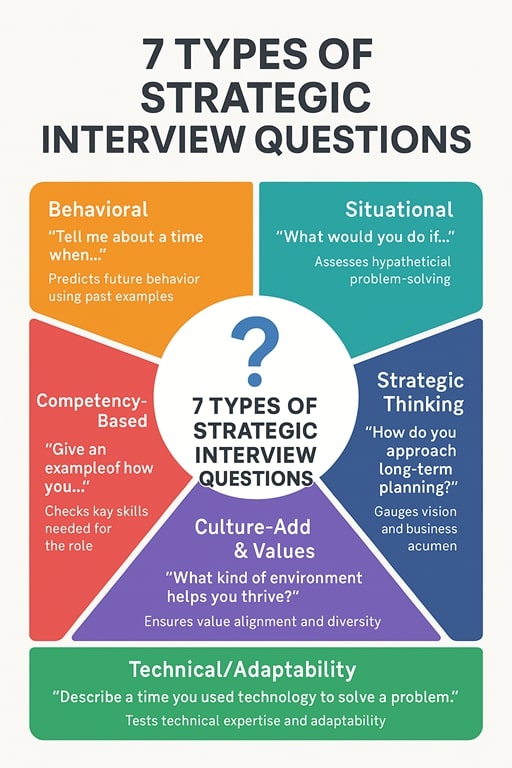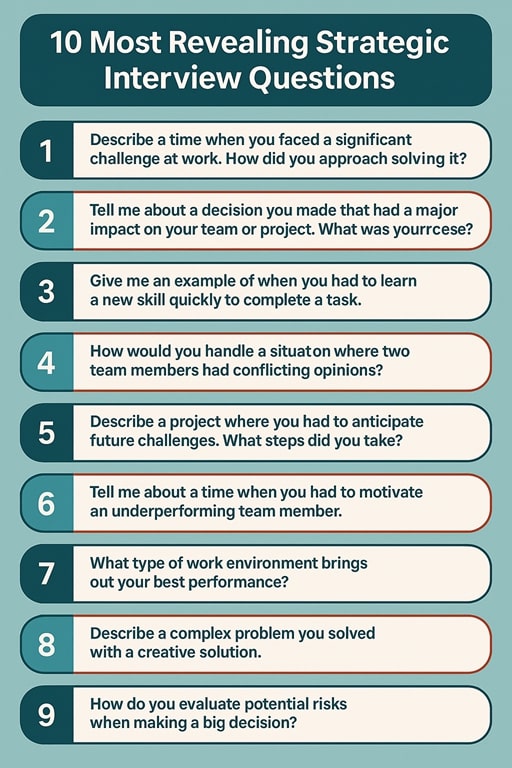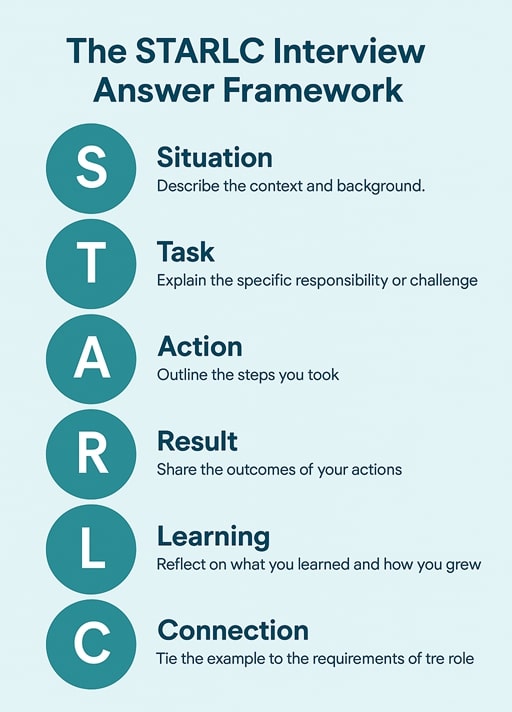Finding and hiring the right talent is one of the biggest challenges facing organizations in 2025. To go beyond the resume and uncover the candidates who will truly excel, companies are turning to strategic interview questions to ask candidates. These carefully crafted questions don’t just test technical skills they reveal a candidate’s mindset, problem-solving abilities, leadership style, and cultural fit.
In this definitive guide, you’ll discover 50 of the most effective strategic interview questions to ask candidates, complete with sample answers, evaluation frameworks, and the latest best practices for hiring success. Whether you’re an HR professional, a hiring manager, or a team leader, using these interview questions will help you make smarter, data-driven decisions and build stronger teams.
Table of Contents
Why Are Strategic Interview Questions Crucial in 2025?
Hiring in 2025 demands more than checking skills and experience. True talent emerges through strategic interview questions that assess problem-solving, leadership, adaptability, and cultural fit. Research shows that structured, well-crafted questions boost hiring accuracy by over 40% and are proven to minimize bias, improve retention, and ensure team alignment.
This guide gives you 50 of the best strategic interview questions to ask candidates plus sample answers to help you confidently hire the best talent.
7 Essential Categories of Strategic Interview Questions
To make the best hiring decision, blend these categories:
- Behavioral Interview Questions
- Situational Interview Questions
- Competency-Based Interview Questions
- Strategic Thinking Questions
- Leadership and Team Development Questions
- Culture-Add and Values Questions
- Technical, Remote, and Adaptability Questions
50 Strategic Interview Questions to Ask Candidates (With Sample Answers)
1. Behavioral Interview Questions (1-10)
1. Tell me about a time you overcame a major challenge at work.
Sample Answer: “When we lost a key client unexpectedly, I initiated a team brainstorm, outlined recovery actions, and personally met with stakeholders to rebuild trust. We retained two other big accounts as a result.”
2. Describe an occasion when you disagreed with your manager. How did you handle it?
Sample Answer: “I respectfully presented data supporting my viewpoint, listened to my manager’s reasoning, and we collaborated to find a solution combining both our ideas.”
3. Give an example of working with someone very different from yourself.
Sample Answer: “I once worked with a very detail-oriented teammate. We balanced each other wellI focused on the big picture while ensuring their input covered all bases.”
4. Share a time you had to learn a new skill rapidly.
Sample Answer: “When our CRM changed, I learned it through online tutorials over a weekend and then trained my team, ensuring a smooth transition.”
5. Tell me about a time you made a mistake and how you handled it.
Sample Answer: “I missed a project deadline due to poor estimation. I owned up, notified the team, adjusted my planning method, and never missed a deadline again.”
6. Describe an instance where you had to deliver under pressure.
Sample Answer: “During a product launch, a system bug appeared last minute. I coordinated with IT and marketing, prioritized fixes, and we launched with minimal delay.”
7. Give an example of going above and beyond for a client.
Sample Answer: “A client’s request came after hours. I worked late, delivered the results before morning, and earned repeat business from them.”
8. Tell me about a time you had to compromise to achieve a goal.
Sample Answer: “Two departments wanted different features. I facilitated a meeting, prioritized must-haves, and both sides agreed to a phased rollout.”
9. Share a time you successfully influenced others.
Sample Answer: “I convinced my team to try agile project management by piloting it on a small project. After we saw results, they adopted it team-wide.”
10. Describe how you handled receiving difficult feedback.
Sample Answer: “Early in my career, I was told my presentations were too technical. I enrolled in a communication course and improved my delivery style.”
2. Situational Interview Questions (11-18)
11. What would you do if you disagreed with a team decision?
Sample Answer: “I’d respectfully share my concerns with supporting evidence, but if consensus favors another direction, I’d commit fully to the team’s choice.”
12. How would you react if you received conflicting priorities from different managers?
Sample Answer: “I’d clarify urgency and impact, communicate transparently, and ask managers to align on priorities together.”
13. Imagine a key stakeholder is unhappy with a project. What steps would you take?
Sample Answer: “I’d listen to their feedback, clarify misunderstandings, provide solutions, and follow up until the issue is resolved.”
14. If you noticed a coworker making a costly mistake, what would you do?
Sample Answer: “I’d discreetly alert them, offer help to correct it, and discuss prevention measures if needed.”
15. How would you handle an urgent deadline with limited resources?
Sample Answer: “I’d assess the tasks, focus on the highest-impact deliverables, delegate as needed, and communicate openly about any risks.”
16. What would you do if your project was about to miss its deadline?
Sample Answer: “I’d immediately notify stakeholders, propose a revised plan, and mobilize extra support to recover lost time.”
17. How would you handle being assigned to a project outside your expertise?
Sample Answer: “I’d do research, seek guidance from experts, and learn as much as possible to contribute effectively.”
18. If you had to deliver negative feedback to a peer, how would you approach it?
Sample Answer: “I’d be specific, focus on behaviornot personalitygive examples, and offer constructive solutions.”
3. Competency-Based Interview Questions (19-26)
19. Give an example of managing multiple priorities.
Sample Answer: “Last quarter, I led two campaigns simultaneously by creating a shared schedule, delegating, and using daily check-ins.”
20. Tell me about a time you improved a work process.
Sample Answer: “I automated repetitive tasks in Excel, saving my team 8 hours weekly.”
21. Describe a time you had to explain a complex idea to someone with no technical background.
Sample Answer: “I used simple analogies and visual aids to explain our software to sales, increasing their confidence to demo it.”
22. Share a time you solved a challenging problem.
Sample Answer: “When our website traffic dropped, I analyzed analytics, found a broken link issue, and traffic rebounded after the fix.”
23. Tell me about a successful project you managed from start to finish.
Sample Answer: “I led a product launch by mapping out milestones, assigning owners, and tracking progress dailyresulting in a record-breaking launch.”
24. Give an example of data-driven decision making.
Sample Answer: “Customer feedback data showed a pain point, so I worked with product to address itsatisfaction scores improved by 18%.”
25. How do you prioritize your tasks each day?
Sample Answer: “I use a priority matrix (urgent/important) and review tasks every morning to ensure focus.”
26. Tell me about a time you persuaded someone to adopt your idea.
Sample Answer: “I presented research supporting my suggestion, answered concerns, and won buy-in from a skeptical stakeholder.”
4. Strategic Thinking Interview Questions (27-34)
27. How do you approach long-term planning?
Sample Answer: “I analyze trends, set clear KPIs, break goals into quarterly milestones, and adjust plans based on results.”
28. Share a time you identified a business risk before others.
Sample Answer: “I noticed market trends shifting, flagged the risk in leadership meetings, and we diversified ahead of competitors.”
29. Describe a decision you made with incomplete information.
Sample Answer: “When facing a tight deadline, I gathered what info I could, weighed options with my team, and made the best decision possible.”
30. Tell me about a time you innovated at work.
Sample Answer: “I created a customer feedback dashboard that improved our product roadmap accuracy.”
31. How do you balance short-term and long-term objectives?
Sample Answer: “I deliver on immediate goals while allocating time each week for strategic projects.”
32. Share a time you made a decision that aligned with company strategy.
Sample Answer: “I prioritized a partnership that fit our core values and growth targets, even though it required short-term sacrifice.”
33. Describe a time you turned a challenge into an opportunity.
Sample Answer: “Budget cuts led me to renegotiate vendor contracts, resulting in cost savings and better service.”
34. How do you stay informed about trends in your industry?
Sample Answer: “I subscribe to industry newsletters, attend webinars, and network with peers to stay ahead.”
5. Leadership & Team Development Interview Questions (35-41)
35. How do you motivate your team during tough times?
Sample Answer: “I recognize achievements, communicate openly, and focus the team on our shared purpose.”
36. Share an example of developing a junior team member.
Sample Answer: “I mentored a new hire with weekly check-ins and growth projectsnow they’re one of our top performers.”
37. Tell me about a time you resolved team conflict.
Sample Answer: “I brought both parties together, encouraged open discussion, and helped them find a win-win compromise.”
38. How do you handle delegation?
Sample Answer: “I assign tasks based on strengths and provide support, allowing autonomy for team members to grow.”
39. Share a time you made a tough leadership decision.
Sample Answer: “I had to reassign a team member not meeting expectationshandled it with empathy and provided support for their transition.”
40. How do you ensure your team remains innovative?
Sample Answer: “I encourage brainstorming, reward experimentation, and never penalize smart failures.”
41. Describe your approach to managing change.
Sample Answer: “I communicate the ‘why,’ involve the team in planning, and provide resources to adapt.”
6. Culture-Add and Values Interview Questions (42-47)
42. What type of company culture helps you excel?
Sample Answer: “Collaborative, transparent, and values-driven environments bring out my best.”
43. Which of our core values resonates with you most?
Sample Answer: “Continuous improvementI’m passionate about always finding better ways.”
44. How do you promote diversity and inclusion?
Sample Answer: “I create space for all voices in meetings and seek diverse perspectives when making decisions.”
45. What motivates you to do your best work?
Sample Answer: “Knowing my work positively impacts the team and customers keeps me motivated.”
46. Describe your ideal relationship with a supervisor.
Sample Answer: “Open, supportive, and feedback-orientedI value clear expectations and honest communication.”
47. How do you handle feedback you disagree with?
Sample Answer: “I listen, ask clarifying questions, and reflect before responding. Even if I disagree, I look for takeaways.”
7. Technical, Remote, and Adaptability Questions (48-50)
48. Tell me about a time you quickly adapted to a major change.
Sample Answer: “When our team went remote, I learned digital tools fast and helped others adjust, which kept us productive.”
49. How do you stay productive in a remote or hybrid team?
Sample Answer: “I set clear goals, maintain regular check-ins, and use shared tools to stay connected and accountable.”
50. Share an example of using technology to improve work outcomes.
Sample Answer: “I implemented an automation tool that eliminated manual data entry, freeing up my team’s time for high-value work.”
How to Evaluate Answers: The STARLC Method
Use the STARLC framework (Situation, Task, Action, Result, Learning, Culture) for fair, in-depth evaluation. Score on a scale from 1 (poor) to 5 (exceptional) for each category.
Strategic Interviewing Best Practices for 2025
- Use a balanced mix of all 7 question categories
- Ask the same core questions for each candidate for consistency and legal compliance
- Allow candidates to ask strategic questions as well
- Document answers using structured scorecards
- Debrief with your interview panel to avoid bias and ensure evidence-based decisions
FAQ: Strategic Interview Questions to Ask Candidates
What is a strategic interview question?
A question designed to assess a candidate’s problem-solving, thinking, adaptability, and valuesnot just technical skill.
How many questions should you ask?
8–12 for a standard interview, chosen from different categories.
How do you measure candidate responses?
With a structured evaluation framework like STARLC and a consistent scoring rubric.
Conclusion: Hire Smarter With Strategic Interview Questions
Asking the right strategic interview questions is the most effective way to reveal a candidate’s true potential. Use these 50 expertly crafted questions and answers to transform your hiring process in 2025. You’ll make more confident, data-driven decisions and build teams that excel now and in the future.


